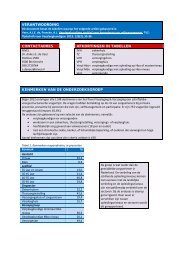Multi-Sensory Stimulation in 24-hour Dementia Care - Nivel
Multi-Sensory Stimulation in 24-hour Dementia Care - Nivel
Multi-Sensory Stimulation in 24-hour Dementia Care - Nivel
Create successful ePaper yourself
Turn your PDF publications into a flip-book with our unique Google optimized e-Paper software.
certa<strong>in</strong> k<strong>in</strong>ds of <strong>in</strong>teraction that are harmful to those who have dementia, and<br />
<strong>in</strong>teractions that make for well-be<strong>in</strong>g (Kitwood, 1996). The <strong>in</strong>teractions that<br />
contribute to the underm<strong>in</strong><strong>in</strong>g of personhood are called ‘malignant social<br />
psychology’. Examples of malignant social psychology are ‘<strong>in</strong>fantilization’ (treat<strong>in</strong>g a<br />
person very patroniz<strong>in</strong>gly <strong>in</strong> the same way as a parent might treat a very young child)<br />
or ‘disempowerment’ (not allow<strong>in</strong>g a person to use the abilities that they have;<br />
fail<strong>in</strong>g to help them to complete actions that they have <strong>in</strong>itiated). The <strong>in</strong>teractions<br />
that are clearly conductive to the ma<strong>in</strong>tenance of personhood and well-be<strong>in</strong>g are<br />
named ‘positive person work’ (Kitwood, 1998). Examples of positive person work are<br />
‘recognition’ (acknowledg<strong>in</strong>g a demented resident as a person and affirm him or her<br />
<strong>in</strong> his or her uniqueness), ‘negotiation’ (consult the demented resident about<br />
preferences, desires, and needs, rather then be<strong>in</strong>g conformed to others' assumptions)<br />
or ‘timalation’ (the direct and pleasurable stimulation of the senses, <strong>in</strong> a way that<br />
accords with the values and scruples of the person with dementia) (Kitwood, 1996).<br />
<strong>Care</strong>givers, and especially Certified Nurs<strong>in</strong>g Assistants (CNAs), are an important<br />
factor <strong>in</strong> the environment of demented nurs<strong>in</strong>g home residents. Accord<strong>in</strong>g to the<br />
Dialectical Framework, there is much that can be done by caregivers <strong>in</strong> psychogeriatric<br />
care that positively <strong>in</strong>fluences the mood and behaviour of nurs<strong>in</strong>g home<br />
residents. To be able to deliver resident-oriented or person-centred care, ‘staffcentred<br />
work environments’ or ‘type B sett<strong>in</strong>gs’, as described by Kitwood, are needed<br />
(1997). In type B sett<strong>in</strong>gs the manager’s role is more one of enabl<strong>in</strong>g and facilitat<strong>in</strong>g<br />
than of controll<strong>in</strong>g, and this <strong>in</strong>volves giv<strong>in</strong>g a great deal of feedback to staff. The<br />
whole staff group (manager, senior care team and care assistants) thrives on<br />
cooperation and shar<strong>in</strong>g. There is a strong commitment to m<strong>in</strong>imize the differential<br />
of power. The organisation is highly skilled <strong>in</strong> <strong>in</strong>terpersonal matters and has welldeveloped<br />
communication pathways. Type B sett<strong>in</strong>gs are sensible to what staff<br />
members are experienc<strong>in</strong>g and feel<strong>in</strong>g. Each staff member can br<strong>in</strong>g matters <strong>in</strong>to the<br />
open, know<strong>in</strong>g that he will not be criticized, but given the support that he needs.<br />
Each resident is recognised <strong>in</strong> his or her uniqueness, through a skilled comb<strong>in</strong>ation<br />
of empathy and personal knowledge (Kitwood, 1997). The creation of type B sett<strong>in</strong>gs<br />
is supposed to lead to <strong>in</strong>creased quality of care, which <strong>in</strong> turn will lead to <strong>in</strong>creased<br />
quality of life for the residents.<br />
The affective state or well-be<strong>in</strong>g of demented elderly people has long received little<br />
attention, with even less concerns to events that promote or threaten well-be<strong>in</strong>g.<br />
From the end of the 20 th century, many caregivers prefer a person-centred approach<br />
to care provision (Innes and Surr, 2001). Once person-centred care has been<br />
realised, the quality of care provided for persons with dementia improves, which will<br />
result <strong>in</strong> <strong>in</strong>creased quality of life of residents. However, a change to person-centred<br />
care is not always easy to achieve. Kitwood argues that the belief that nurses have <strong>in</strong><br />
Introduction 13

















